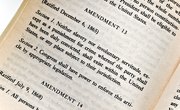In December, 2004, the federal government announced changes in the way it calculates family contributions to their children's college educations. The new calculation can make it appear that families have more money to contribute than they did in the past, which has the potential of rendering approximately 90,000 students ineligible for the federal Pell Grant.
Significance
Because of the change in calculating the EFC -- Expected Family Contribution -- these families appeared to have more money than they did in the past, meaning the government would require them to pay more for their child's college tuition; the calculation change also had the effect of lowering the government's Pell Grant award to these students. In light of this change, some students whose families did not have those funds available found themselves having to work their way through school or quit school entirely.
Effects
If a college student's GPA drops below the minimum qualification of 2.0, she will lose her eligibility for federal grant funds, including her Pell Grant. Until she brings her GPA back up, she won't be able to qualify for a federal grant. One caveat -- if her GPA is just below 2.0, the grant is still cut off. However, she may be able to file an appeal through school's financial aid office. The appeal will be reviewed by a panel of university/college professionals who will decide on a case-by-case basis whether to continue awarding the federal aid to that student.
Considerations
Engaging in illegal behavior -- criminal behavior -- and facing federal charges is enough to disqualify students for federal grant aid for higher education. For instance, if a student is caught dealing drugs, whether on campus or not, he could face federal drug trafficking charges. The financial aid questionnaire has a question about being convicted of a drug offense. If a student has been convicted of a first offense, he loses federal aid for one year; a second offense loses him financial aid for two years. A third offense merits a permanent ban on federal financial aid.
Prevention/Solution
In order to counter the effect of stripping needed financial assistance to some college students in upstate New York, Senators Jon Corzine, Ted Kennedy, Gordon Smith and Charles Schumer introduced legislation which would allow the new EFC calculation to be applied to students "who would not see a reduction in their financial assistance as a result of the change." These senators also sent a letter to President George W. Bush, asking him to restore the cuts in his Fiscal Year 2006 budget proposal. See this on the Empire State News website, referenced in the Additional Resources section below.
Potential
When the funding formula changed, the concern was that the numbers of students having their grants reduced could approach 1.2 million. 84,000 could be disqualified for Pell Grants. If a student's income is close to the cutoff, this could mean the difference between attending school or dropping out. Some students who had qualified for the Pell Grant also qualified for other grant programs which awarded their funds exclusively to Pell Grant recipients.
Related Articles
Writer Bio
Genevieve Van Wyden began writing in 2007. She has written for “Tu Revista Latina” and owns three blogs. She has worked as a CPS social worker, gaining experience in the mental-health system. Van Wyden earned her Bachelor of Arts in journalism from New Mexico State University in 2006.










